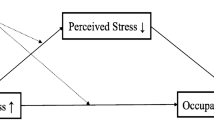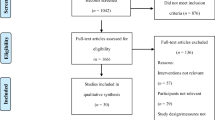Abstract
Objective
Burnout is a prolonged psychological response to a longstanding interpersonal stressor at work. It can progress to other mental illnesses, such as anxiety and depression. In today’s society, burnout has become widespread, and it is currently a serious challenge in health systems. This study intended to investigate the impact of mindfulness training on burnout and depression, anxiety, and stress of nonmedical staff in a hospital in Shiraz-Iran.
Method
Fifty nonmedical staff in a Shiraz-Iran hospital were enrolled in this two groups’ randomized controlled trial. The intervention group was trained by a modified mindfulness-based stress reduction (MBSR) program, and the control group received no intervention. The outcome was assessed by the Copenhagen burnout inventory (CBI) and DASS-21 questionnaire on three occasions including before T0, immediately after T1, and 3 months after the intervention T2.
Results
Comparing the score changes between intervention and control groups showed that the reduction of work‑distaste‑related burnout, client‑related burnout, anxiety, and stress scores in the intervention group was significantly more than in the control group in the time interval from T0 to T1.
The scores in the intervention group in three subscales of CBI, including work‑characteristic‑related burnout, work‑distaste‑related burnout, and client‑related burnout, decreased significantly immediately after the training (T1) compared to before (T0). Also, the scores did not change significantly after 3 months following training.
Conclusions
Mindfulness training can be used as an effective way to improve occupational burnout, anxiety, and stress in occupations other than health professionals. Its effect is stable for at least a few months. It is recommended that future studies focus on investigating the feasible way to integrate this training into the working environment. Forthcoming studies should also determine whether the impact of this intervention will last longer and find possible ways to extend its influence.



Similar content being viewed by others
References
Abolhalaj MHPSH, Jafari Sirizi M, Inanloo S (2009) Survey of human resources working in the country’s hospitals in 2007. J Shahrekord Univ Med Sci (shahrekord University of Medical Sciences Journal) 12(1):60–68 (1389 [Cited 2021 June 01])
Akbari F, Kokabi F (2011) Determining nursing manpower needed in a sample hospital. Hosp J 9(3):69–76
Aziz TA, Amin RRH, Ahmed ZA, Sleman HJ, Aziz BH (2021) Occupational toxicity and health hazards of the healthcare providers at healthcare facilities in Sulaimani City, Iraq. Iraqi J Pharm Sci 30(2):41–49. https://doi.org/10.31351/vol30iss2pp41-49
Binkley PF, Levine E (2019) Organizational strategies to create a burnout-resistant environment. Clin Obstet Gynecol 62(3):491–504. https://doi.org/10.1097/GRF.0000000000000459
Boutron I, Moher D, Altman DG, Schulz KF, Ravaud P, Group* C (2008) Methods and processes of the CONSORT Group: example of an extension for trials assessing nonpharmacologic treatments. Ann Intern Med 148(4):60–66. https://doi.org/10.7326/0003-4819-148-4-200802190-00008-w1
Ceravolo D, Raines DA (2019) The impact of a mindfulness intervention for nurse managers. J Holist Nurs 37(1):47–55. https://doi.org/10.1177/0898010118781620
Cheung DSK et al (2020) The use of modified mindfulness-based stress reduction and mindfulness-based cognitive therapy program for family caregivers of people living with dementia: a feasibility study. Asian Nurs Res 14(4):221–230. https://doi.org/10.1016/j.anr.2020.08.009
Cohen J (2013) Statistical power analysis for the behavioral sciences. Academic Press
Dobie A, Tucker A, Ferrari M, Rogers JM (2016) Preliminary evaluation of a brief mindfulness-based stress reduction intervention for mental health professionals. Australas Psychiatry 24(1):42–45. https://doi.org/10.1177/1039856215618524
Ducar DM, Penberthy JK, Schorling JB, Leavell VA, Calland JF (2020) Mindfulness for healthcare providers fosters professional quality of life and mindful attention among emergency medical technicians. Explore 16(1):61–68. https://doi.org/10.1016/j.explore.2019.07.01
Duchemin A-M, Steinberg BA, Marks DR, Vanover K, Klatt M (2015) A small randomized pilot study of a workplace mindfulness-based intervention for surgical intensive care unit personnel: effects on salivary α-amylase levels. J Occup Environ Med/am Coll Occup Environ Med 57(4):393. https://doi.org/10.1097/JOM.0000000000000371
Ghasemi Jobaneh R, Nazari A, Sanai Zaker B (2018) The effect of mindfulness training on reducing couple burnout of addict’s wife. J Res Health 8(6):506–512. https://doi.org/10.29252/jrh.8.6.506
Grunfeld E, Whelan TJ, Zitzelsberger L, Willan AR, Montesanto B, Evans WK (2000) Cancer care workers in Ontario: prevalence of burnout, job stress and job satisfaction. CMAJ 163(2):166–169
Jam S, Imani AH, Foroughi M, Seyed ANS, Emadi KH, Mohraz M (2010) The effects of mindfulness-based stress reduction (MBSR) program in Iranian HIV/AIDS patients: a pilot study. Acta Med Iran 48(2):101–106
Janssen M, Heerkens Y, Kuijer W, Van Der Heijden B, Engels J (2018) Effects of mindfulness-based stress reduction on employees’ mental health: a systematic review. PLoS ONE 13(1):e0191332. https://doi.org/10.1371/journal.pone.0191332
Kabat-Zinn J (1982) An outpatient program in behavioral medicine for chronic pain patients based on the practice of mindfulness meditation: theoretical considerations and preliminary results. Gen Hosp Psychiatry 4(1):33–47. https://doi.org/10.1016/0163-8343(82)90026-3
Kabat-Zinn J (2009) Wherever you go, there you are: mindfulness meditation in everyday life. Hachette Books
Kabat-Zinn J, Hanh TN (2009) Full catastrophe living: using the wisdom of your body and mind to face stress, pain, and illness. Delta
Kazemian M, Mahboobi AP, Meskarpour AM (2014) Assessment of physician human resources in Iran based on the goals of 1st-4th development plans. Med Sch 21(110):0–0
Klein A, Taieb O, Xavier S, Baubet T, Reyre A (2020) The benefits of mindfulness-based interventions on burnout among health professionals: a systematic review. Explore 16(1):35–43. https://doi.org/10.1016/j.explore.2019.09.002
Kober SE et al (2017) Ability to gain control over one’s own brain activity and its relation to spiritual practice: a multimodal imaging study. Front Hum Neurosci. https://doi.org/10.3389/fnhum.2017.00271
Kriakous SA, Elliott KA, Lamers C, Owen R (2021) The effectiveness of mindfulness-based stress reduction on the psychological functioning of healthcare professionals: a systematic review. Mindfulness 12(1):1–28. https://doi.org/10.1007/s12671-020-01500-9
Kristensen TS, Borritz M, Villadsen E, Christensen KB (2005) The copenhagen burnout inventory: a new tool for the assessment of burnout. Work Stress 19(3):192–207. https://doi.org/10.1080/02678370500297720
Mahmoud NN, Rothenberger D (2019) From burnout to well-being: a focus on resilience. Clin Colon Rectal Surg 32(06):415–423. https://doi.org/10.1055/s-0039-1692710
Mahmoudi S, Atashzadeh-Shoorideh F, Rassouli M, Moslemi A, Pishgooie AH, Azimi H (2017) Translation and psychometric properties of the Copenhagen burnout inventory in Iranian nurses. Iran J Nurs Midwifery Res 22(2):117. https://doi.org/10.4103/1735-9066.205958
Maslach C, Leiter M (2006) Burnout. Stress Qual Work Life 37:42–49
Meditation (2018) Cancer Research UK. http://about-cancer.cancerresearchuk.org/about-cancer/cancer-in-general/treatment/complementary-alternative-therapies/individual-therapies/meditation [Last accessed 18 May 2018]
Meredith C, Schaufeli W, Struyve C, Vandecandelaere M, Gielen S, Kyndt E (2020) ’Burnout contagion’among teachers: a social network approach. J Occup Organ Psychol 93(2):328–352. https://doi.org/10.1111/joop.12296
Moghadam ZK, Nejhad SN, Ahmady K (2016) Examining the effectiveness of group mindfulness-based cognitive therapy on marital burnout in married women in mental and emotional dimensions of region 1 in tehran. Int J Humanit Cult Stud 1:2008–2016
Moody K et al (2013) Helping the helpers: mindfulness training for burnout in pediatric oncology—a pilot program. J Pediatr Oncol Nurs 30(5):275–284. https://doi.org/10.1177/1043454213504497
Nyklíček I, Kuijpers KF (2008) Effects of mindfulness-based stress reduction intervention on psychological well-being and quality of life: is increased mindfulness indeed the mechanism? Ann Behav Med 35(3):331–340. https://doi.org/10.1007/s12160-008-9030-2
Peterson U, Demerouti E, Bergström G, Samuelsson M, Åsberg M, Nygren Å (2008) Burnout and physical and mental health among Swedish healthcare workers. J Adv Nurs 62(1):84–95. https://doi.org/10.1111/j.1365-2648.2007.04580.x
Pickert K (2014) The art of being mindful. Finding peace in a stressed-out, digitally dependent culture may just be a matter of thinking differently. Time 183(4):40–46
Potter D (2018) Palouse mindfulness: mindfulness-based stress reduction. Retrieved from pages at https://palousemindfulness.com [Last Accessed 22 May 2022]
Rusch HL et al (2019) The effect of mindfulness meditation on sleep quality: a systematic review and meta-analysis of randomized controlled trials. Ann N Y Acad Sci 1445(1):5–16. https://doi.org/10.1111/nyas.13996
Sahebi A, Asghari MJ, Salari RS (2005) Validation of depression anxiety and stress scale (DASS-21) for an Iranian population. J Dev Iran Psychol 1(4):50–60
Schroeder DA, Stephens E, Colgan D, Hunsinger M, Rubin D, Christopher MS (2018) A brief mindfulness-based intervention for primary care physicians: a pilot randomized controlled trial. Am J Lifestyle Med 12(1):83–91. https://doi.org/10.1177/1559827616629121
Toneatto T, Nguyen L (2007) Does mindfulness meditation improve anxiety and mood symptoms? A review of the controlled research. Can J Psychiatry 52(4):260–266. https://doi.org/10.1177/070674370705200409
West CP, Shanafelt TD (2007) Physician well-being and professionalism. Minn Med 90(8):44–46
West CP, Dyrbye LN, Shanafelt TD (2018) Physician burnout: contributors, consequences and solutions. J Intern Med 283(6):516–529. https://doi.org/10.1111/joim.12752
Acknowledgements
The Vice Chancellor for Research at Shiraz University of Medical Sciences funded this project. Hamidreza Ghazipoor performed this research in partial fulfillment of the requirements for certification as a Family Medicine specialist at Shiraz University of Medical Sciences in Shiraz, Iran, under Grant Number: 97-01-01-16920. We also wish to acknowledge Alzahra Heart Hospital staffs who participated in this research. The trial protocol was registered in the Iranian Registry of Clinical Trials with IRCT Id: IRCT20190604043813N1.
Author information
Authors and Affiliations
Corresponding author
Ethics declarations
Ethical approval
Ethics Committee of Shiraz University of Medical Sciences approved this study with ethical code: IR.SUMS.MED.REC.1397.276.
Additional information
Publisher's Note
Springer Nature remains neutral with regard to jurisdictional claims in published maps and institutional affiliations.
Supplementary Information
Below is the link to the electronic supplementary material.
Rights and permissions
About this article
Cite this article
Haghighinejad, H., Ghazipoor, H., Jafari, P. et al. Investigating the impact of modified mindfulness-based stress reduction (MBSR) program on occupational burnout and other mental health status among nonmedical staff in a hospital: a randomized controlled trial. Int Arch Occup Environ Health 95, 2005–2016 (2022). https://doi.org/10.1007/s00420-022-01902-3
Received:
Accepted:
Published:
Issue Date:
DOI: https://doi.org/10.1007/s00420-022-01902-3




